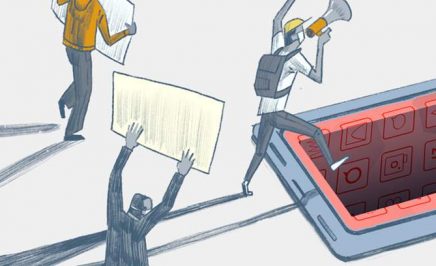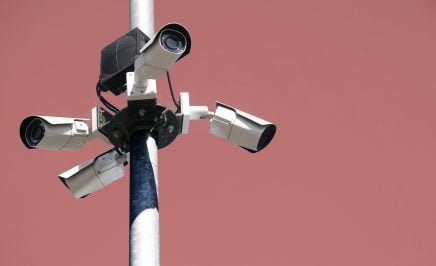If there’s one thing 2020 has underscored, it’s our reliance on the online world for social connection and interaction.
For many of us, online platforms and services like Facebook and Google’s offered a lifeline during the pandemic, allowing us to stay in touch with family and friends, to move work and schooling online and to get up-to-date health information. But this convenience comes at a cost to our human rights, including our mental health, as is powerfully shown in The Social Dilemma, a documentary released on Netflix.
The Social Dilemma opens our eyes to the way our lives are constantly monitored – and controlled – by these platforms. It’s the Truman Show on steroids, monitoring one third of the planet.
Back in April former Google CEO Eric Schmidt expounded “the benefit of these corporations — which we love to malign — in terms of the ability to communicate … the ability to get information, is profound…” and said that people should be grateful that “these companies got the capital, did the investment, built the tools that we’re using now and have really helped us out.” In the documentary, however, Silicon Valley insiders paint a very different picture. They argue that the worst aspects of humanity keep manifesting themselves on these platforms as a direct result of how the platforms were designed.
These platforms are designed to optimize three things: i) how long can they keep eyeballs glued to screens; ii) how many new users they can get; and iii) how much ad revenue they can generate from serving ads to people whose eyeballs are on screens.
The Social Dilemma opens our eyes to the way our lives are constantly monitored – and controlled – by these platforms. It’s the Truman Show on steroids, monitoring one third of the planet.
Rasha Abdul Rahim, Co-Director Amnesty Tech
This all feeds their underlying business model, which is essentially to harvest and monetize our personal information. This model’s fundamental characteristic is to aggregate vast amounts of data on people by keeping them on the platforms for as long as possible, use that data to infer incredibly detailed profiles on people’s lives and behaviour, and monetize it by selling those predictions to whoever wants to influence them.
As we warned in our 2019 report, the surveillance-based business model of Facebook and Google is not only inherently incompatible with the right to privacy, but poses a systemic threat to a range of other rights including freedom of opinion and expression, freedom of thought, and the right to equality and non-discrimination.
Algorithms on YouTube determine what video will play next, while on Facebook they determine the content on our feeds and what ads will be served to us. Very often these algorithms amplify disinformation and divisive content, fuel racism, and even influence our own beliefs and opinions.
The film reveals how teams comprising predominantly white men in Silicon Valley are explicitly tasked with exploiting the vulnerabilities of our human psychology: our addictive nature, our need for social validation and our bias towards incendiary and sensationalist content. Precisely because these companies worked out that this is the best way to keep us on for longer, get more and more data about us, make better predictions about us and profit from selling us ads.
In other words, the whole information ecosystem that currently serves one third of the planet was set up not to serve us but to manipulate and use us. Facebook and Google services appear “free” but, as former Google designer Tristan Harris says in the film, “if you’re not paying for the product, you are the product”. And the dominance of the companies’ platforms means it is now effectively impossible to engage with the internet without “consenting” to their surveillance-based business model.
Although the film positions this as a “social dilemma”, it does not need to be a dilemma at all. Despite what we have been led to believe, the internet does not need to depend on surveillance. People who signed up for platforms when they were far more privacy-respecting or before they were acquired by Facebook or Google now face a choice between leaving a service they depend on or submitting to constant surveillance. This is not – and should not be – a legitimate choice.
We urgently need governments to step up and introduce regulations to overhaul the business model and protect our rights. This a systemic and structural issue that won’t be easy to address and will require a mix of political, legal and structural solutions.
Efforts to set much stricter limits on the tracking and use of personal data won’t be enough if they don’t address the concentration of data – and power – in the hands of Facebook and Google. At the same time, the increasing chorus of politicians, regulators and academics who propose that Big Tech should be “broken up”, will fail to address the systemic human rights abuses unless they push for measures that holistically tackle the surveillance-based business-model itself.
No one approach will work on its own, nor can we solve the social dilemma alone. We need leadership and urgent action from our governments to protect us from the abuses of Big Tech.








